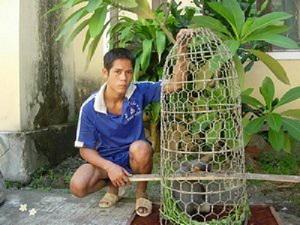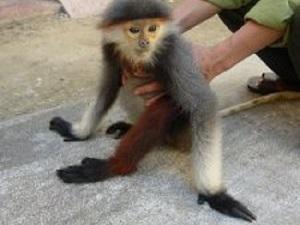Anh Le Doan
The aim of project is to better conserve the Red-Shanked Douc Langur in Bach Ma National Park and surrounding areas through raising awareness of this species within local communities and educating the school children to encourage them in the species conservation program.

The hunter and Pygathrix nemaeus nemaeus.
The colobine monkeys of the genus Pygathrix are native to Indochina. Until only ten years ago, just two distinct taxa were recognized: the red-shanked douc, Pygathrix nemaeus, named by Linnaeus in 1771, in the northern part of Central Vietnam and Central Laos; and the black-shanked douc, P. nigripes, from South Vietnam and east Cambodia, described exactly a century later by Milne-Edwards .

Release the P. nemaeus into the forest.
The red-shanked douc langur has been listed as EN A1cd (IUCN Red List ver 2.3 (1994)), Appendix I (CITES), Endangered (Red Book on Fauna of Vietnam, 2004), and category IB (Decree 32/2006/ND-CP of Vietnam). However, their population sizes in the wild appear to decline because of several conservation problems. Firstly, habitat loss and forest fragmentation is one of the most important factors threatening this species. Secondly, it is currently known as one of the most popular primates in the food and pet trade. They are considered a delicacy all over Southeast Asia. In addition, it is also in danger of becoming medicinal products because some traditional oriental medicines use douc langur body parts (Camille Dorian, 2002). Under pressure from hunting and habitat loss, the number of this species is dwindling fast. Lastly, limiting on skills of species monitoring and conserving of conservationists due to lacking the specific information of species as well as non-participating of local communities on wildlife conservation is another cause of the decline of this species in nature. Without immediate and decisive conservation action, these species are likely to become extinct very soon.
The aim of this project is to protect the extinction of this species in its original distribution by involving the local people and schools on the conservation process. Training courses and workshops will provide local communities with the necessary skills for conserving this species. The conservation lessons, puppet-plays, draw and learn competitions about the species organised will help the young generations to have better attitude and responsibility to wildlife conservation. The commitment and action plan to protect this species and its natural habitat will be done and monitored by local people that help the communities become "owners" of the conservation process and thereby the things could change for the better. Posters, calendars, and T-shirts with drawings of P. nemaeus nemaeus will be distributed to the communities, schools and neighbour communities to propagandise the project results.